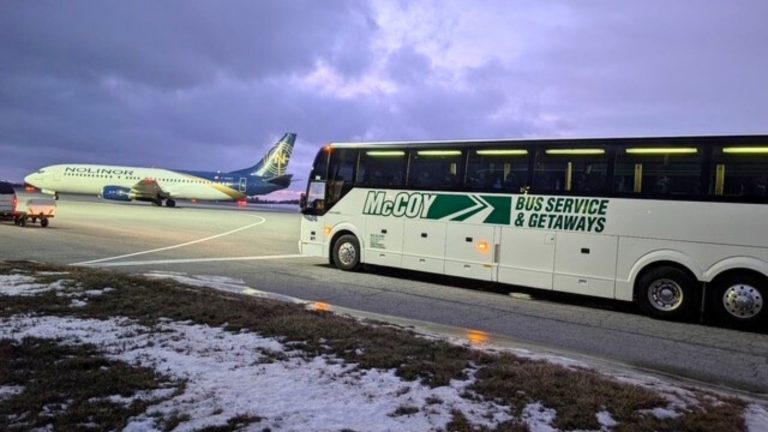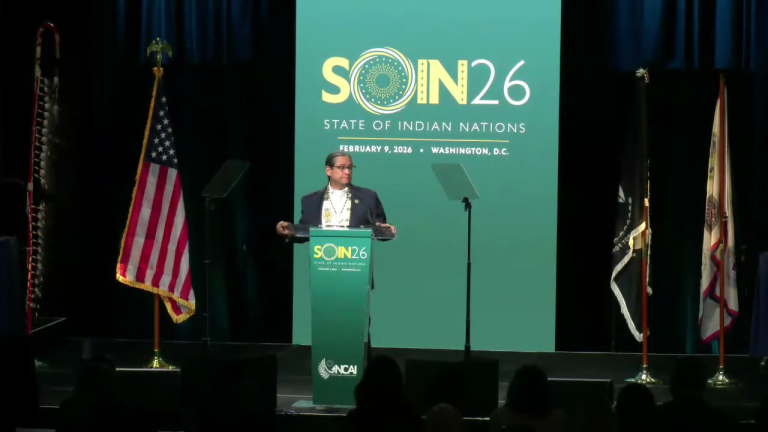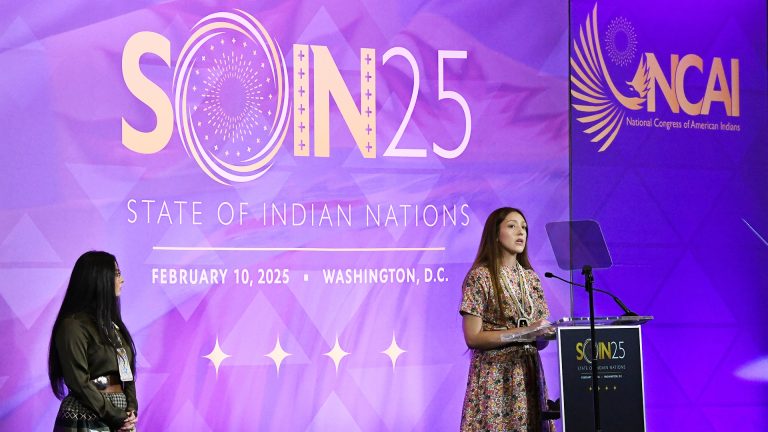Podcast: Play in new window | Download | Embed
National Native News teamed up with New Mexico In Focus , the USC Annenberg-Center for Health Journalism and the Dennis A. Hunt Health Journalism Fund for a series highlighting health and wellness in Native America. Stories aired on both tribal and public radio stations across the country and on New Mexico PBS. The series examines some of the ways Indigenous people in California, New Mexico and Arizona are taking control of their mental and physical health.
According to the Centers for Disease Control and Prevention, Native Americans and Alaska Natives are more likely to report their health is fair or poor compared to other groups, particularly Caucasians. Rates of diabetes, suicide and chronic illnesses are often higher in Native communities.
The project examines the use of both cultural practices and Western medicine. The stories follow programs, tribes and grassroots efforts, which advocates and health care officials say could lead to a positive change in health outcomes for Native communities. The stories examine how a better understanding of different approaches may lead to new data and knowledge on longstanding public health concerns for other Native Nations.

Members of the Salt River Pima-Maricopa Indian Community’s Young People’s River Council. (Photo-Antonia Gonzales)
Native young people across the country are finding ways to make positive changes in their communities. A youth council at the Salt River Pima-Maricopa Indian Community is making strides when it comes to safety, and health and wellness.
In our USC Annenberg-Center for Health Journalism series we visit with some members of the Young People’s River Council.
In our USC Annenberg-Center for Health Journalism series, Chef Brian Yazzie shares his knowledge on traditional foods.

Community Health Worker Brian Robles with Native Health and children involved in Native Health’s Wellness Warriors program tend land. Native Health hopes an urban garden will provide traditional foods and enhance wellness among community members. (Photo-Antonia Gonzales)
Tribes, health care providers and Native organizations across the country including in the Southwest are working to bring fresh, healthy foods to Native people to increase access to traditional foods and improve public health.
In our USC Annenberg-Center for Health Journalism series we travel to Phoenix, Arizona where Native Health is developing a new urban garden for the Native community.
In our series “Reconnecting with a Healthy Lifestyle,” Antonia Gonzales and Sarah Gustavus examine the role of farming and traditional foods in increasing access to fresh produce in Native American communities. They visit the Pueblo of Tesuque in New Mexico and a community garden in Phoenix that’s run by the Native Health clinic.
This series was produced with support from the USC Annenberg-Center for Health Journalism and the Dennis A. Hunt Fund for Health Journalism.

A seed bank and farm in New Mexico preserves traditional Indigenous seeds from across Indian Country. (Photo-Antonia Gonzales)
Food sovereignty projects across the country are helping tribes provide traditional foods to their communities, as Native Americans continue to face high rates of obesity, diabetes and other diseases. Health professionals point to a lack of access to healthy, fresh foods as a contributing factor.
In our USC Annenberg-Center for Health Journalism series we take a look at an effort in New Mexico to help community members grow traditional crops.
Native Americans are using online tools to improve their health. Our report from Antonia Gonzales and Sarah Gustavus is part of the ongoing series produced with support from the USC Annenberg-Center for Health Journalism and the Dennis A. Hunt Fund for Health Journalism.

Technology is playing a role in health and wellness efforts across the nation including in Indian Country, as we hear in our USC Annenberg-Center for Health Journalism series.
Correspondent Antonia Gonzales and producer Sarah Gustavus travel to the Navajo Nation to explore what’s being done to fight diabetes and obesity by reducing consumption of soda and sugary beverages, and look at one school’s innovative way to get filtered water to more people on the Navajo Nation. Their coverage is supported by the USC Annenberg National Fellowship and the Dennis A. Hunt Fund for Health Journalism.

Students and a teacher at the STAR School in Arizona take part in a water quality lesson on a decommissioned school bus, which is retrofitted with a filtration unit. School officials plan to take the bus to nearby Navajo communities to filter well water. (Photo-Antonia Gonzales)
Native organizations and health advocates are among those trying to get young Native people to switch from drinking sugary beverages like soda and energy drinks to water. The Service To All Relations School, known as the STAR School, near the Navajo reservation in Flagstaff, Arizona is trying out a water first approach to address disease and at the same time find solutions to tackle the long standing lack of access to clean water on the Navajo Nation. We visit the school in our USC Annenberg-Center for Health Journalism series.
This story is supported by the Dennis A. Hunt Fund for Health Journalism, a program of the University of Southern California, Center for Health Journalism.
Chronic illnesses, particularly diabetes, is a longstanding public health concern in many tribal communities in the Southwest. Native Americans are also more likely to be obese than many other groups, according to data from the Centers for Disease Control and Prevention, which has been associated with diabetes and pre-diabetes. Health professionals say lack of access to fitness centers and limited fresh, healthy foods are among contributing factors to health outcomes, but some individuals have overcome many challenges and are now sharing information and resources with others in their community.

Navajo actor and health advocate Loren Anthony prepares meals in his house in Gallup, New Mexico. Anthony uses meal preparation to promote healthy eating and encourage people to look at their attitudes about food. (Photo-Antonia Gonzales)
Researchers say social determinants can impact people’s health including social structures and economic systems. What this looks like in Indian Country often includes limited health care services, overcrowded housing, and lack of fitness centers and outdoor recreational areas. There are individuals who are examples of resiliency in promoting health and wellness in Native America at the grassroots level, as we see in our USC Annenberg-Center for Health Journalism series. Read the story here.
This story is supported by the Dennis A. Hunt Fund for Health Journalism, a program of the University of Southern California, Center for Health Journalism.
Being active is a value among many Native nations across the country. Physical activity is often included in stories and ceremonies and an active lifestyle was historically part of survival. Today, health experts say sedentary ways are contributing to high rates of obesity and diabetes in Indian Country. Some fitness experts and enthusiasts are working to bring resources and support to help Native people with their health concerns. In our USC Annenberg-Center for Health Journalism series, we travel to two border towns in the Southwest to explore these grassroots efforts.
This story is supported by the Dennis A. Hunt Fund for Health Journalism, a program of the University of Southern California, Center for Health Journalism.
At United American Indian Involvement in Los Angles, we meet Dr. Carrie Johnson, a clinical psychologist, who helped bring cultural activities into existing behavioral health services at the center. Program participants at a drum and dance class speak about what wellness means to them and how culture is part of their efforts to decrease stress, engage in their community and maintain sobriety.

Tso Yanez and his son drum and sing at United American Indian Involvement in Los Angeles, California. Yanez says reconnecting to Native culture has helped him with sobriety. (Photo-Antonia Gonzales)
Los Angeles is a city, which covers more than 460 square miles and has nearly four million residents. Less than two percent of the population is Native American, according to U.S. Census statistics. It can often be difficult for Native people in Los Angeles County to find culturally relevant services. In our Center for Health Journalism series on health and wellness in Native communities, we take a look at the connection between Native culture and mental health among urban Native people living in the LA area.
This story is supported by the Dennis A. Hunt Fund for Health Journalism, a program of the University of Southern California, Center for Health Journalism.

Street art and graffiti cover walls in Indian Alley in Los Angeles, California. The alley’s history includes Native people who once lived there on the streets. Native people still face housing and other challenges living in the city, but many are going to Indian centers for services, a place to find a network of support, and reconnect to their Native culture. (Photo-Antonia Gonzales)
Native parents in Los Angeles County are turning to the Southern California Indian Center for support. Families face a number of challenges living in a large urban area, and some parents may not have access to services or help from their family or tribe. Through a fellowship with the USC Annenberg-Center for Health Journalism, we travel to LA and look at a program, which is helping ensure babies and parents are safe, healthy, and at the same time connecting them to other Native Americans in the big city. Read the story here.
This story is supported by the Dennis A. Hunt Fund for Health Journalism, a program of the University of Southern California, Center for Health Journalism.
Reconnecting with a Healthy Lifestyle is a radio special. Tribal leaders, health advocates and grassroots coalition members discuss wellness initiatives, promoting food sovereignty programs to increase access to fresh produce, and new ways to improve the overall health of tribal communities. From urban gardens and tribal seed banks, to Indigenous smartphone apps to sharing traditional recipes, Native people are reconnecting to their traditions and culture to address disease and encourage others to live a holistic way of life.




